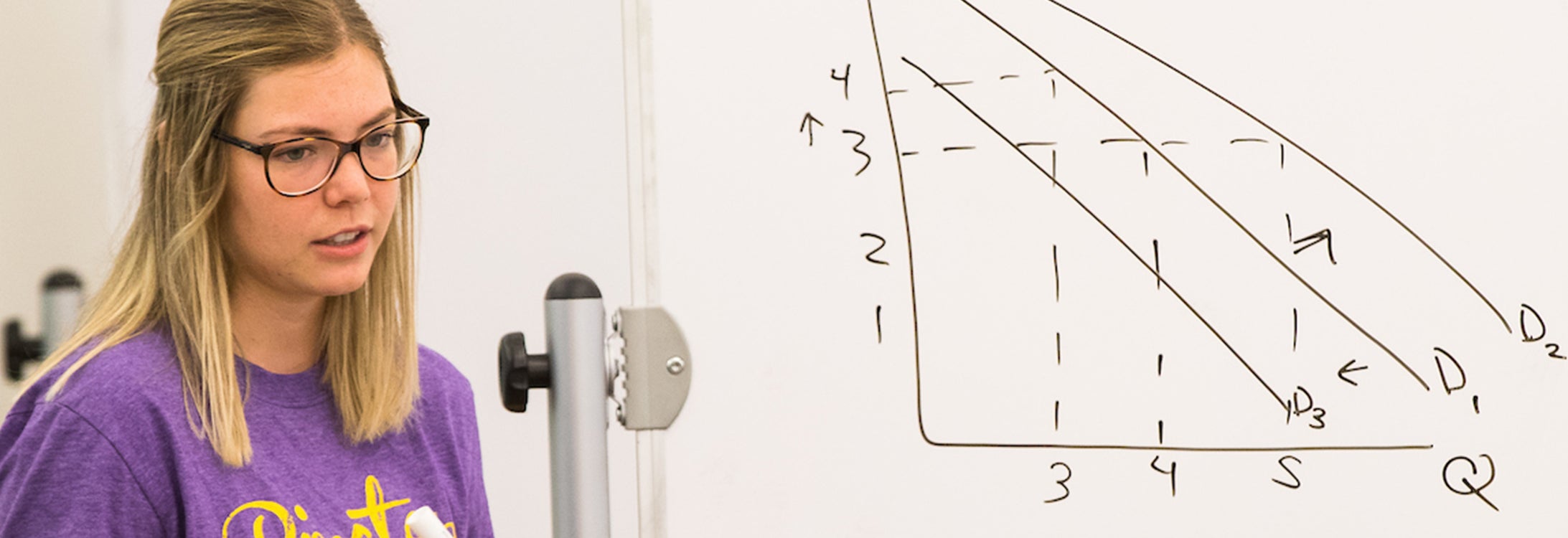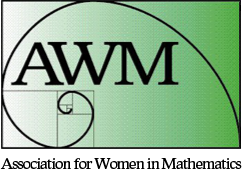The Math Program at ECU
East Carolina University offers the BA, BS, and MA degrees in mathematics. The bachelor’s program is highly flexible, allowing you to pursue your interest through complementary course work in related fields and a range of options in mathematics, statistics, and computer science. Many career paths are available to the mathematics major. Most of these require some knowledge of other areas as well as good communication and computer skills. Consider a degree in mathematics with a second major, minor, or significant course work in business, computer science, economics, or education.
All courses in the major are taught in small classes by faculty who hold doctoral degrees from top universities. They are experts in a wide range of mathematical specialties, both pure and applied, who engage in research and publication. They are also dedicated teachers who will get to know you and meet with you outside of the classroom.
How does university-level math differ from high school math?
In high school, mathematics courses usually emphasize computational techniques-factoring polynomials, solving equations, and the like. At the university level, there is a much greater emphasis on ideas, and proof plays a greater role. Calculations still matter but it no longer suffices to “get the right answer” by applying a recipe in mechanical fashion. At heart, mathematics concerns the search for underlying patterns and the precise communication of meaning.
Mathematics as a science
The science of mathematics differs from empirical sciences such as biology, chemistry, and physics. Theories in these fields are supported by bodies of observation and remain true until invalidated or refined by new information. Mathematical theories are supported by deductive proof and remain true forever. For example, the geometry of the ancient Greeks is still valid and useful even though Euclid wrote his famous Elements more than two thousand years ago!
Mathematics-the golden age
Mathematics is a world of ideas with an ancient history including such brilliant minds as Euclid, Fermat, Newton, and Gauss. But did you know that new mathematics is being created every day? In fact, an enormous amount of mathematics has been produced during the past century, and the pace of new development has accelerated during your lifetime. All of this activity parallels the explosive growth in other scientific fields but has received much less press attention. Many people mistakenly believe that mathematics is a “dead field” consisting of knowledge that evolved many centuries ago. They do not realize that we live in the golden age of mathematics.
Pure math, applied math, and statistics
Mathematics is intrinsically interesting and merits study for its own sake. Applied mathematics use the ideas and results of mathematics to solve problems in the real world. It is striking that the same mathematics used to launch a satellite into orbit can be used to analyze financial markets. Applied mathematics plays a role in virtually everything. Mathematical modeling is used to predict hurricanes, the behavior of the stock market, and dosages for radiation treatment. When biomedical researchers investigate the efficacy of new treatments or a business checks the quality of items manufactured in a facility, they use statistics to enhance the validity of their findings. Required course work in the mathematics major provides a broad foundation in each of these overlapping areas: pure math, applied math, and statistics. Elective courses provide the opportunity for deeper study of those topics that interest you the most.
Bachelors and Early Admission to Masters in Mathematics
Students working toward a bachelor’s degree in mathematics have the opportunity to gain early admission and complete the MA degree in two or three additional semesters of study. As seniors they may be granted early admission (see “Six-hour Rule”) to the MA program and would be eligible to receive paid teaching assistantships upon becoming full-time graduate students. To be enrolled in the MA program as a senior, a student must be within 6 s.h. credit of completing all undergraduate degree requirements. These students are encouraged to begin research projects as undergraduates and take up to 6 s.h. of graduate classes in their senior year which may be applicable to the MA degree requirements. Graduate courses taken under the six hour rule do not double count toward completion of the undergraduate degree. Applications to the MA program should be submitted during the first semester of the senior year and must include GRE scores. Please contact the Mathematics Department Graduate Director for more information (choiju@ecu.edu).
The ECU advantage
- With an emphasis on undergraduate education, our upper-level mathematics classes are small and taught by faculty who will give you individual attention.
- You will be advised by mathematics faculty who will help you design a program that fits your needs and goals, selecting from a wide range of specialized courses in mathematics and other disciplines.
- The faculty includes recognized experts in their fields who are at the forefront of current research developments in mathematics and its applications.
You can earn money, credits, and experience through a mathematics-related co-op program. An internship can enhance your job prospects upon graduation. - You can work as a tutor in our Mathematics Help Lab, providing you with an opportunity to earn money while gaining experience and sharpening your math skills.
- You’ll have access to state-of-the-art computer facilities and the ECU Joyner Library’s extensive holdings of more than 5,000 volumes in mathematics.
Is mathematics the right degree for you?
Let’s be frank. Mathematics is among the most demanding of the undergraduate majors. This is one reason why mathematics graduates are readily employable in a wide range of areas. Prospective employers understand that, apart from their problem-solving skills, math majors have demonstrated their ability to work hard while mastering a difficult subject. If you are looking for an easy major and lots of time to party, mathematics is not the right choice for you. But ask yourself these questions: Did you do well in your high school math and science courses? Do you enjoy a challenge, games, and puzzles? Are you a curious person who likes to understand how things work? If your answers are “yes”then you should consider majoring in mathematics.
These excellent sites are devoted to career possibilities for math majors:



